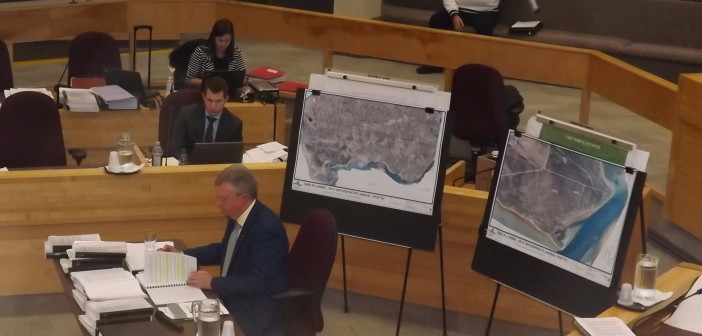On July 15th, 2013, Don McConnell, city planner for the City of Sault Ste. Marie, presented his final report in support of Jeff and Dr. Patricia Avery’s proposed plans for their Pointe Estates development in Pointe Louise. In a rare demonstration of opposition City Council rejected the advice of City Staff and voted against the proposed development.
McConnell appeared before the OMB this week still firm on his decision. “I am even more content, if that is possible, with my decision since the release of the 2014 PPS.”
McConnell shared his translation of the 2014 Provincial Policy Statement which guides this OMB process. Note that when McConnell issued his report on the Pointe Estate proposal it was under the 2005 PPS regime.
“There was a change between the 2005 and 2014 PPS- it has to do with the way they treat coastal wetlands. What the 2014 PPS says is that you can’t develop in significant coastal wetlands- that is section 2.1.4 and if you read 2.1.5 it says development and site alteration shall not be permitted in –and I’m going to jump down to ‘f’ here, coastal wetlands in Ecoregions 5E, 6E and 7E1 -I mentioned earlier that we are 5E, are not subject to the policy above 2.1.4 – which means if it’s a significant coastal wetland- you can’t develop. End of discussion. If it’s a coastal wetland but if it’s not provincially significant, you cannot develop unless it has been demonstrated that there are no negative impacts on the natural features or the ecological functions.”
*****
The issue of whether or not the Pointe Louise wetland was a provincially significant one or not was a contentious issue over the years leading up to today’s hearing.
Avery contracted Tulloch Engineering to conduct a wetland assessment. The final report, dated March 2010, found that the wetland did not meet the standard for ‘provincially significant’ status. The Ministry of Natural Resources accepted the findings of the report.
The Pointes Protection Association retained Brian Henshaw, principle senior ecologist of Beacon Environmental to provide a review of Tulloch’s evaluation. In Henshaw’s expert opinion he determined that the wetland was a provincially significant wetland.
Henshaw stated, “In addition there is photographic and other evidence to indicate the presence of additional fen within the currently evaluated area and, more importantly, potential additional wetland areas, that could further increase the score. These potential wetlands could be investigated to see if they are wetlands and if so whether or not they should be included in the evaluation.”
*****
In McConnell’s opinion the reports submitted by the developer satisfied the requirements for the necessary permissions to proceed with the development. McConnell also believes that when considering the location of the Pointe Louise wetland- in Northern Ontario, the loss of the coastal wetland is inconsequential.
“Geographic variation is the issue that comes up over and over again. In Southern Ontario we have paved all of our wetlands- how can we do that in Northern Ontario? And the answer is ‘we’re not’. There is a recognized need for the most protection in areas of the province with the greatest developmental pressure. There’s no area in Northern Ontario that suffers from ‘greatest developmental pressure’. We’re not proposing to pave over our wetlands- but there is geographic differentiation.”
Referring to the February 2014 report An Introduction to the Provincial Policy Statement, 2014: Northern Ontario – Draft for Discussion, McConnell adds, “If anything I read this and see them as saying that in Southern Ontario you have to take a harder line. They’re not saying that about Northern Ontario.”
McConnell emphasized that in making his determination to recommend that City Council approve Avery’s request for a planning permit on July 15th, 2013, he considered some issues on a broader perspective.
“We’re going to lose some wetland but in the big scheme of things what does that mean? I think it is safe to say most of Sault Ste. Marie wetlands are coastal. When you look at the wetland loss in terms of the municipality it is 1% overall.”
It is McConnell’s professional opinion that the negative impacts created by the development need to be put into perspective.
“I look at where are we now and from the angle in terms of where we will be when this development is complete. Part of the wetland is being maintained. I haven’t seen anything saying that it’s going to go away. The ecological functions are largely being maintained. They are not being eliminated. From a negative impact viewpoint –are some negative? Yes. Are some positive? Yes. We’re getting some better fish habitat and were getting the Allagash Canal cleaned up. At the end of the day what do we have- and whatever we do we have an impact, but is it a significant negative impact? No.”


